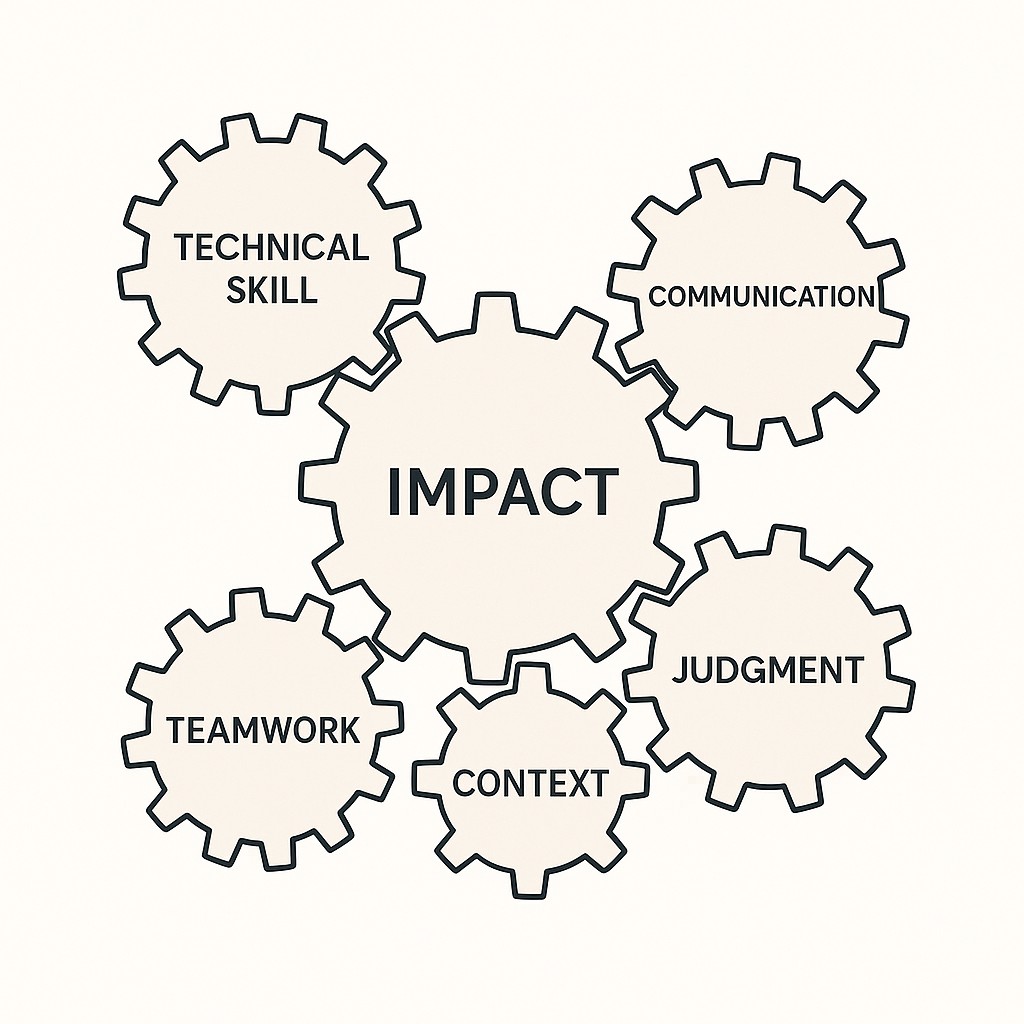Skill Stacking for Engineers: The Real 10x Multiplier
Skill Stacking for Engineers: The Real 10x Multiplier

The Real ‘10x’: How Impact Compounds in Engineering Teams
A few years back, I walked into a project assuming our fastest coder would be the edge, only to discover that skill stacking for engineers is what actually lifts the whole team. Honestly, it was the assumption everyone made. But the one who changed the game for us wasn’t the star of the commit log. Instead, it was our teammate who knew just enough about React to get things done but had this knack for piecing together what everyone was struggling with. If one of us hit a wall, they’d ask a dead-simple question that forced everyone to see the bigger picture.
When two features overlapped or risked colliding, they caught it early, not by writing the most code, but by connecting dots and quietly pulling a few of us together to untangle the mess. Over a few months, you could feel the shift. Blockers melted, we shipped things ahead of schedule, and people felt like their work mattered more. That person didn’t have the cleanest pull requests or the flashiest demos, but they raised the bar for the whole team.
I wish I could say I saw that value right away, but I kept equating impact with speed for too long. Admitting that raw output isn’t the only—or even the best—measure of value is uncomfortable. It cuts against a lot of instincts, especially when most reward systems seem to celebrate visible velocity.
Say “10x engineer” and most picture a lone wolf. Individual engineers don’t actually own software—the team does, which means individual speed isn’t what moves projects forward most. That’s the mismatch. The myth doesn’t fit how actual results happen in teams.
And yet, we’ve all heard the story. This idea that there’s a unicorn out there who can do the work of ten “normal” engineers. But most teams chasing that story only end up burned out and misaligned. They don’t capture the outcomes promised.
So here’s the real multiplier. Stack complementary skills instead of chasing ‘10x’ velocity in a single direction. Over a decade leading teams, the pattern is clear. When technical skill is layered with communication, product sense, context awareness, and the willingness to make people around you better, outcomes don’t add up. They multiply. That’s how you build leverage you can actually feel—and results that last beyond your own keystrokes.
How Skill Stacking for Engineers Compounds Your Impact
Think of compounding like gear ratios. When you combine even modest strengths across multiple gears, the overall system delivers way more force than any one gear could alone. A small upgrade in technical skill, paired with slightly better communication, doesn’t just give you two separate benefits. It’s more like letting you climb steeper hills with less effort. In engineering teams, this is how outcomes start to multiply. Not in straight lines, but in jumps you actually feel.

Here’s what skill stacking for engineers looks like at its core: solid technical ability, clear communication, product judgment, context awareness, and making others better. If you focus only on coding faster, you miss the actual levers that drive real progress in teams like ours.
Pressure phases are where this becomes real. There was a stretch last year—a product pivot, new deadline, half the team heads-down trying not to drown. The go-to move used to be, “Ship faster.” Except speed by itself just led to merge conflicts and feature gaps.
What saved us was when one engineer kept tabs on shifting priorities, sensed when tensions were rising, and started pulling in short standups to recalibrate. Blockers surfaced faster, nobody spun out alone, and the team adjusted before any fires caught. Higher emotional intelligence consistently boosts job performance, especially in tough situations, which is exactly what kept the project from tipping. That phase taught me that coding speed feels powerful until you’re out of step with your actual environment. Then it’s just noise.
If you’re reading this, forget the myth of being “the best” at one thing. Being reasonably strong across five areas is far rarer—and far more valuable—than being 10x in just one. That’s a true multiplier, and most teams desperately need more builders who play at that level.
The benchmark shouldn’t be how fast you can code. The best engineers multiply value through others, not just their own keyboard. That’s how you build leverage for the whole team, not just yourself.
The Skill Stacking Playbook
Let’s talk practice. Engineering skill stacking isn’t a one-time philosophy. It’s a deliberate, repeatable toolkit. The good news is you can start using it this week. Pick one area, apply the playbook for a few days, and you’ll start seeing small changes compound.
First, tackle communication. Great engineers don’t just “fire off” messages. They write to align. Next time you settle a decision—even a small one—send a three-bullet Slack recap highlighting what changed. When questions drag on, post a short summary to the group chat. And be intentional with docs. Draft them for your future self and your teammates, not your ego. Ask what you’d want to search for six months later. Docs people actually read and use are the ones that trim complexity, answer follow-ups before they get asked, and actually get referenced. You don’t have to be a natural writer. Just get clearer, not wordier.
Now, product judgment. You’ll build engineering leverage skills by asking sharper outcome-first questions. Here’s the counterintuitive one I use: “What would happen if we didn’t build this at all?” That single reset can trigger upstream and downstream clarity nobody’s surfaced yet.
I’ll admit, I missed it once. We were chewing over a feature for a client, and the whole team assumed it was non-negotiable. I spent too long estimating, coordinating, and heads-down coding—until someone asked, “What’s the actual risk of skipping this?” That question flipped our scope and revealed half the work was defending against a scenario that never really happened. We saved a release cycle just by pressing pause and tracing real impact. You don’t need to outsmart everyone—just out-question the assumption pile.
Actually, a tangent here. Last spring, I found myself obsessively color-coding my calendar, trying to squeeze in more “focus blocks.” It worked for about a week, until I noticed the slot labeled “deep work” was always the first thing I let slip when someone needed help or a new fire popped up. The irony is I was modeling single-player optimization, instead of leaning into the team stack that had actually moved us forward before. Took me a while to connect the dots—turns out the best multipliers sometimes look like interruptions from the outside.
Next play: context awareness. Shape what gets built by listening for actual outcomes, not just initial requests. Most asks are shorthand for deeper needs. I keep coming back to this. If you only deliver what’s asked for, you end up patching the symptom instead of solving the problem. When you focus discussions on outcomes over outputs, you surface the constraints and value channels that truly matter. It’s easier to get alignment once you frame conversation around what moves the needle, not just the checklist.
Don’t forget the last lever—make others better. You multiply impact by mentoring, raising clarity in reviews, and calling out healthy conflict when it helps the team. Here’s a simple habit to start: pick just one resource—a book, an article, even a checklist—on feedback or conflict resolution, and use it to upgrade how you respond when someone’s stuck. Nobody gets this perfect on day one, but every effort multiplies.
Practice these behaviors, even if imperfectly, and you’ll see your individual skills compound into something much bigger. Outcomes that scale, teams that grow, and a career not bound by how fast you type.
Tracking Multiplicative Impact—Not Just Coding Speed
There’s a real fear that if you slow down even a little—just to clarify what’s needed or get context—you’ll lose velocity and fall behind on building multiplicative impact for engineers. I’ve made that mistake more times than I’d like to admit. Fixating on raw output, rushing to push code, then circling back days (or weeks) later to fix what should’ve been aligned up front. Turns out, every shortcut in communication costs me double in rework. When I started making quick, intentional investments—ten extra minutes to outline a design, pause to ask about use cases—the team moved faster, not slower. In hindsight, sprinting solo only buys short-lived progress. Clarity compounds and pays back every time.
Forget tracking “hours spent.” What matters is alignment wins and blockers cleared. Those real markers of collective progress. The simplest way to measure it? Use the daily standup. Instead of rattling off tasks, quickly flag where blockers were surfaced and resolved, or where a clarification helped someone deliver cleanly. That’s impact you can see, not just effort you can log.
Pay attention to the ripple effects across the team. You’ll spot the difference in the everyday signals: fewer escalations, review cycles that finish faster, Slack threads that are actually clear, and handoffs people trust. These are leading indicators you’re compounding impact. When teams adopt AI even modestly, documentation steps up 7.5%, code quality grows 3.4%, and code review speed jumps 3.1%—each a ripple from stronger team habits. Watch for these shifts. They’re where real progress gets built.
Don’t buy into the myth that durable impact is born, not built. True impact comes from deliberate growth, not genius. If you want to increase your leverage—for yourself and your team—commit to stacking skills over chasing one mythical strength. It’s a choice, and one you can make today.
There’s still one thing I haven’t really worked out. Sometimes, focusing so much on the collective multipliers makes me worry we’ll overlook the value of deep, specialized expertise. The tension’s there. I haven’t cracked the balance, and I suspect the answer shifts depending on team size, domain, and urgency. But even now, I keep betting on the multi-skill stack being what delivers most over time.
Make Your Stack, Compound Your Impact
Here’s a practical starting line. Choose two areas in your skill stack—maybe product judgment and communication, or pair context awareness with mentoring—to be 2x stronger in. This week, schedule one focused session for each. Mark your calendar for deeper dives later this quarter. Block the time. Treat it like any other technical upskilling.
Try this daily ritual. Send a 3-bullet summary of what matters to your stakeholders, and jot down one insight you picked up from today’s builds or blockers. After solving something hard, grab five minutes, write a one-paragraph note on what actually cracked it for you.
Generate AI-powered standup notes, stakeholder updates, and concise docs in minutes, so communication stops being a blocker and you can focus on shipping the right things with fewer loops.
Let’s reframe the goal as we close: stack skills for impact. You’re not chasing some mythical 10x standard or hoping for legendary status. What you’re doing is stacking complementary skills, multiplying your impact by making other engineers better, and shaping outcomes that ripple beyond code. Remember my teammate from the opening story—the one whose impact transformed our results? It wasn’t about raw speed. It was the quiet, deliberate stacking that lifted all of us.
Stick with this. The payoff compounds. Outcomes multiply, teams get healthier, and your career outlasts the headline myths. Even small steps build results you can actually feel.
Enjoyed this post? For more insights on engineering leadership, mindful productivity, and navigating the modern workday, follow me on LinkedIn to stay inspired and join the conversation.
You can also view and comment on the original post here .
